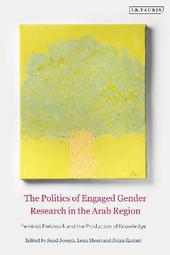
|
The Politics of Engaged Gender Research in the Arab Region: Feminist Fieldwork and the Production of Knowledge
Paperback / softback
Main Details
| Title |
The Politics of Engaged Gender Research in the Arab Region: Feminist Fieldwork and the Production of Knowledge
|
| Authors and Contributors |
Edited by Suad Joseph
|
|
Edited by Lena Meari
|
|
Edited by Zeina Zaatari
|
| Physical Properties |
| Format:Paperback / softback | | Pages:232 | | Dimensions(mm): Height 234,Width 156 |
|
| Category/Genre | Colonialism and imperialism |
|---|
| ISBN/Barcode |
9780755645220
|
| Classifications | Dewey:305.4209174927 |
|---|
| Audience | | Professional & Vocational | | Tertiary Education (US: College) | |
|---|
|
Publishing Details |
| Publisher |
Bloomsbury Publishing PLC
|
| Imprint |
I.B. Tauris
|
| Publication Date |
25 August 2022 |
| Publication Country |
United Kingdom
|
Description
Critical analysis of what we know - and do not know - about women in the Arab region is needed to support social change. But how is knowledge on women and gender produced in the region? How does this change when it is undertaken by Arab women researchers? Through a critical examination of local fieldwork experiences, the contributors of the volume - who are Arab women researchers themselves - answer these questions. The book examines the specific structural conditions that shape people's lives in the Arab region, from the effects of imperialism, settler colonialism and the neo-liberalization of economies, to racial capitalism, securitization, and embedded patriarchal ideologies and structures. The authors assess the implications of these different dynamics on undertaking research and also examine their own daily lives, the lives of their interlocutors, and the practices of their field. In doing so, they are able to escape hegemonic approaches and frameworks to the study of gender and to instead theorize from the local context to produce knowledge as they see it. This 'engaged gender research' challenges dominant discourses in academia, rejects the presumptions of 'Arab exceptionalism', and challenges liberal feminisms. It devises a new way of undertaking research on gender in the region to lay the foundation for a more just tomorrow. Covering Morocco, Tunisia, Palestine, Jordan, Syria, Iraq and the Arab Gulf, the book argues that an engaged gender research - which is feminist and critically analyses the historical, political, economic and social contexts of the research topic first - will transform how we understand women and gender, and the Arab World.
Author Biography
Suad Joseph is Distinguished Research Professor of Anthropology and Gender, Sexuality and Women's Studies at the University of California, Davis in the U.S. She founded the Association for Middle East Women's Studies and co-founded its internationally recognized Journal of Middle East Women's Studies; she also founded the Arab Families Research Group, and co-founded the Arab American Studies Association and the Association for Middle East Anthropology. She has edited or co-edited eight books, published over 100 articles, and is General Editor of the highly esteemed Encyclopedia of Women and Islamic Cultures. Lena Meari is Assistant Professor at Birzeit University, Palestine, and Acting Director of their Institute of Women Studies. Previously she was a postdoctoral research at the Center for Palestine Studies at Columbia University, U.S. She specializes in the geopolitics of knowledge production, decolonized methodologies, colonial structures and colonial relations, and completed her PhD at the University of California, Davis, U.S. She has published in various peer-reviewed journals and edited books. Zeina Zaatari is Director of the Arab American Cultural Center at the University of Illinois, Chicago in the U.S. She has worked on gender and racial justice in Arab and Arab American communities both within academic and non-profit spaces. She has published numerous chapters and articles and serves as Associate Editor for the renowned Encyclopedia of Women and Islamic Cultures.
ReviewsEmerging from long-term collaborations and trainings, this set of critical and deeply moving essays exemplify how feminist epistemologies can productively explore the intersections of self, location and subject in different research settings and contexts. This volume is an essential addition to the library of all those interested and invested in transforming gender dynamics in the Arab region. -- Seteney Shami. Arab Council for the Social Sciences, Lebanon
|